Removing of HTTPS security warning: Difference between revisions
No edit summary |
No edit summary |
||
| Line 1: | Line 1: | ||
For accessing the device WebaUI using HTTPS it requires a certificate, else it will show the below error: | For accessing the device WebaUI using HTTPS it requires a certificate, else it will show the below error: | ||
[[File:16.png|left]] | [[File:16.png|left|alt=|border]] | ||
In this example, we will be able to access the device webpage using HTTPs, with a free certificate from a free CA. | In this example, we will be able to access the device webpage using HTTPs, with a free certificate from a free CA. | ||
| Line 12: | Line 12: | ||
#2 Go to: [https://getacert.com/cert/selfcertalt.pl '''GetAcert'''] website. | #2 Go to: [https://getacert.com/cert/selfcertalt.pl '''GetAcert'''] website. | ||
#3 Fill in the information regarding your requirements: | #3 Fill in the information regarding your requirements: | ||
[[File:Getacert1.png|center]] | [[File:Getacert1.png|center|alt=|border|1102x1102px]] | ||
'''NOTE:''' 1,2 and 3 are the names you want to use in the browser. | '''NOTE:''' 1,2 and 3 are the names you want to use in the browser. | ||
Other information isn’t mandatory. Click '''Next Page'''. | Other information isn’t mandatory. Click '''Next Page'''. | ||
| Line 18: | Line 18: | ||
#4 Check the data once again, if everything is okay click '''Submit self-signed Certificate''': | #4 Check the data once again, if everything is okay click '''Submit self-signed Certificate''': | ||
[[File:Getacert2.png|center]] | [[File:Getacert2.png|center|alt=|border]] | ||
#5 The final page: | #5 The final page: | ||
[[File:Getacert3.png|center]] | [[File:Getacert3.png|center|alt=|border|1102x1102px]] | ||
#6 Click on (+) beside '''Open Private Key''': | #6 Click on (+) beside '''Open Private Key''': | ||
[[File:Getacert4.png|center]] | [[File:Getacert4.png|center|alt=|border|1102x1102px]] | ||
Copy the text to a new Notepad file, and rename it to '''name.crt''' in my case I used a simple name '''cer.crt''' | Copy the text to a new Notepad file, and rename it to '''name.crt''' in my case I used a simple name '''cer.crt''' | ||
#7 Click on (+) beside Open Public Key: | #7 Click on (+) beside Open Public Key: | ||
[[File:Getacert5.png|center]] | [[File:Getacert5.png|center|alt=|border|1102x1102px]] | ||
Copy the text to a new Notepad file, and rename it to '''name.key''' in my case I used a simple name '''key.key''' | Copy the text to a new Notepad file, and rename it to '''name.key''' in my case I used a simple name '''key.key''' | ||
#8 Click on the [.p12] file, and it will be downloaded:<br /> | #8 Click on the [.p12] file, and it will be downloaded:<br /> | ||
[[File:Getacert6.png|center]] | [[File:Getacert6.png|center|alt=|border|1102x1102px]] | ||
#9 Go to the Microsoft search bar and type: '''cer''' then choose Manage user certificates: <br /> | #9 Go to the Microsoft search bar and type: '''cer''' then choose Manage user certificates: <br /> | ||
[[File:Windows1.png|center]] | [[File:Windows1.png|center|alt=|border]] | ||
| Line 42: | Line 42: | ||
[[File:Windows2.png|center]] | [[File:Windows2.png|center|alt=|border|1102x1102px]] | ||
#11 Right-click and highlight '''All Tasks''', click '''Import…''' | #11 Right-click and highlight '''All Tasks''', click '''Import…''' | ||
| Line 48: | Line 48: | ||
[[File:Windows3.png|center]] | [[File:Windows3.png|center|alt=|border|1102x1102px]] | ||
| Line 54: | Line 54: | ||
#12 Choose the .p12 file downloaded before:<br /> | #12 Choose the .p12 file downloaded before:<br /> | ||
[[File:Windows4.png|center|alt=| | [[File:Windows4.png|center|alt=|border]] | ||
| Line 64: | Line 64: | ||
1) Turn off '''Certificate files from device'''. | 1) Turn off '''Certificate files from device'''. | ||
[[File:RUT1.png|center]] | [[File:RUT1.png|center|alt=|border|1102x1102px]] | ||
| Line 70: | Line 70: | ||
3) Click browse in '''Server key''' and choose the [.key] file created. | 3) Click browse in '''Server key''' and choose the [.key] file created. | ||
[[File:RUT2.png|center]] | [[File:RUT2.png|center|alt=|border|1102x1102px]] | ||
4) Click '''SAVE & APPLY'''. | 4) Click '''SAVE & APPLY'''. | ||
| Line 76: | Line 76: | ||
<sup>'''<big><big>Open the WebUI again using the DNS record:</big></big>'''</sup> | <sup>'''<big><big>Open the WebUI again using the DNS record:</big></big>'''</sup> | ||
[[File:Windows done.png|center]] | [[File:Windows done.png|center|alt=|border|1102x1102px]] | ||
'''<big>Now we can access the WebUI securely, and we can turn of the HTTP access.</big>''' | '''<big>Now we can access the WebUI securely, and we can turn of the HTTP access.</big>''' | ||
Revision as of 11:43, 1 November 2022
Main Page > General Information > Configuration Examples > Router control and monitoring > Removing of HTTPS security warningFor accessing the device WebaUI using HTTPS it requires a certificate, else it will show the below error:

In this example, we will be able to access the device webpage using HTTPs, with a free certificate from a free CA.
Certificate creation and trust:
- 1 You must have a DNS record linked to the IP of the router; in my case, I’m using a Windows server to act as a DNS server.
As shown, I choose a hostname rut955.teltonika.uae and it's linked with 172.16.16.1 the LAN IP of the router. This hostname will be used for creating the certificate later.
- 2 Go to: GetAcert website.
- 3 Fill in the information regarding your requirements:

NOTE: 1,2 and 3 are the names you want to use in the browser. Other information isn’t mandatory. Click Next Page.
- 4 Check the data once again, if everything is okay click Submit self-signed Certificate:
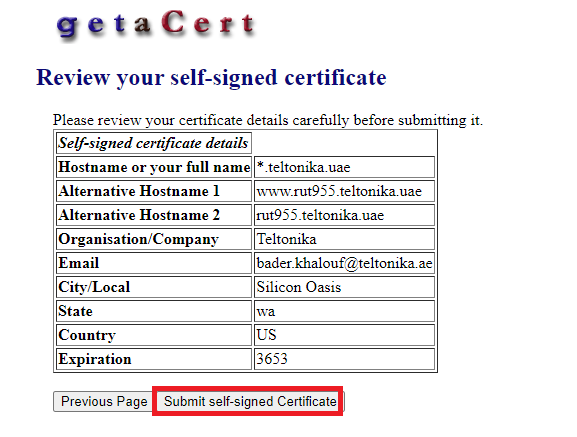
- 5 The final page:
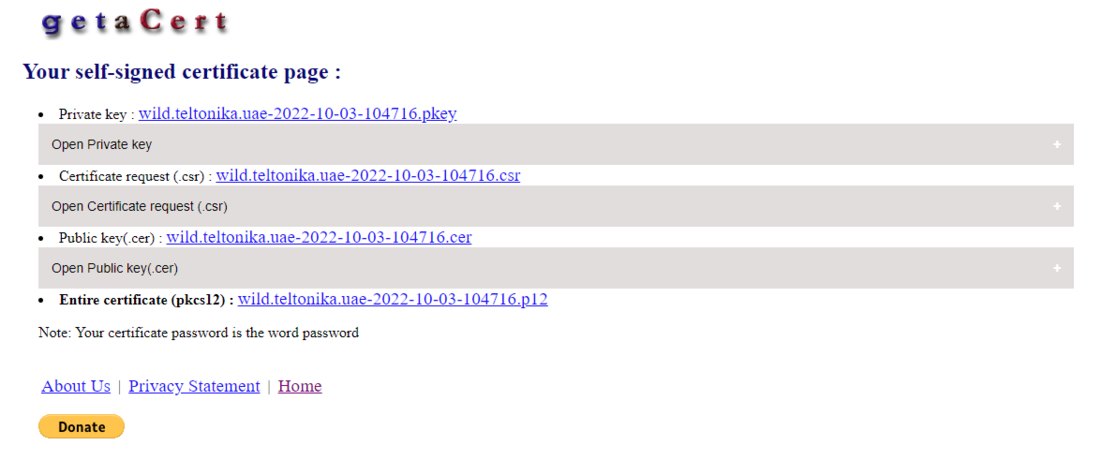
- 6 Click on (+) beside Open Private Key:
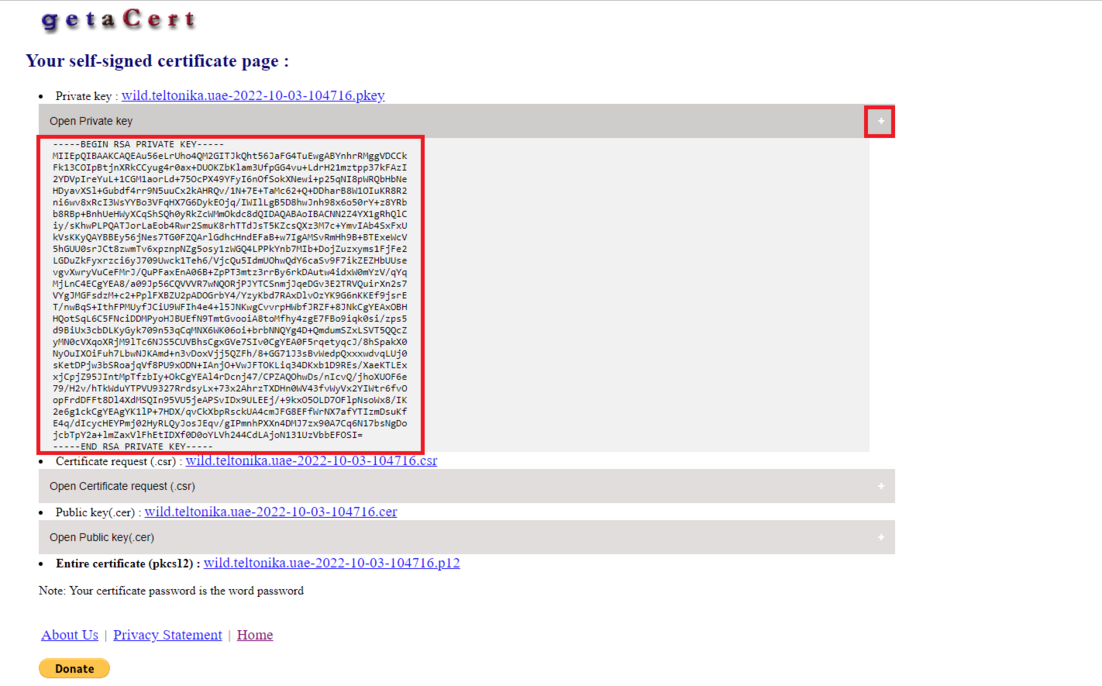
Copy the text to a new Notepad file, and rename it to name.crt in my case I used a simple name cer.crt
- 7 Click on (+) beside Open Public Key:
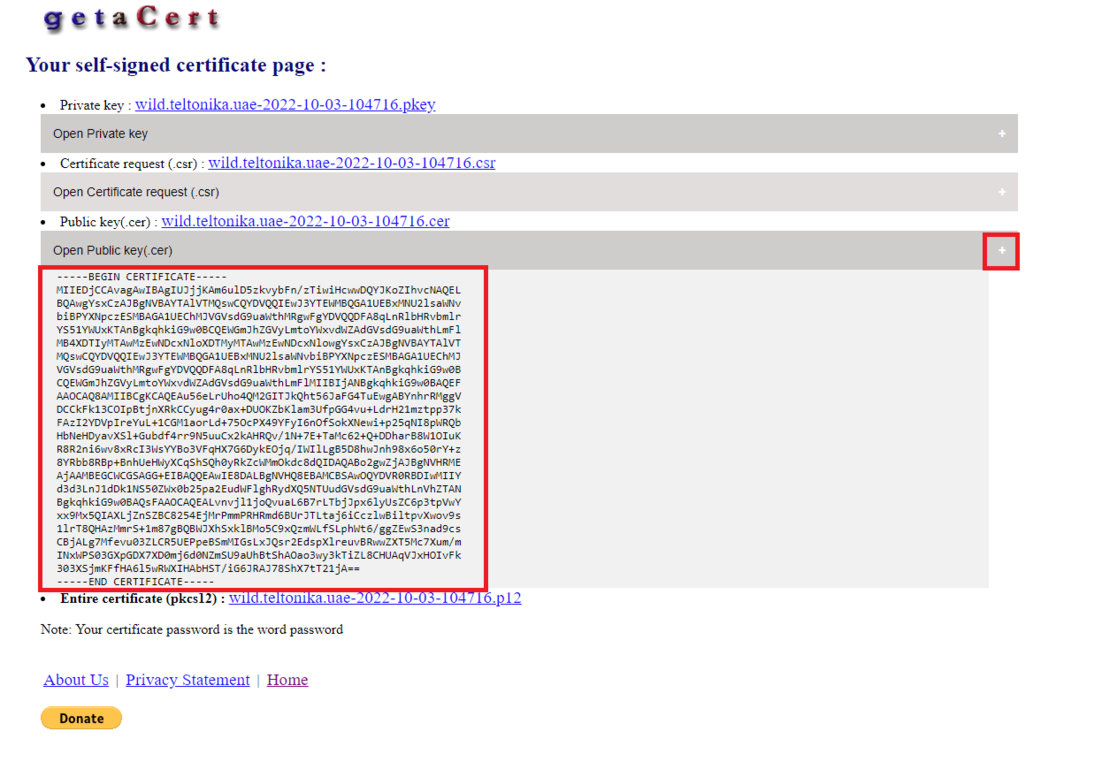
Copy the text to a new Notepad file, and rename it to name.key in my case I used a simple name key.key
- 8 Click on the [.p12] file, and it will be downloaded:
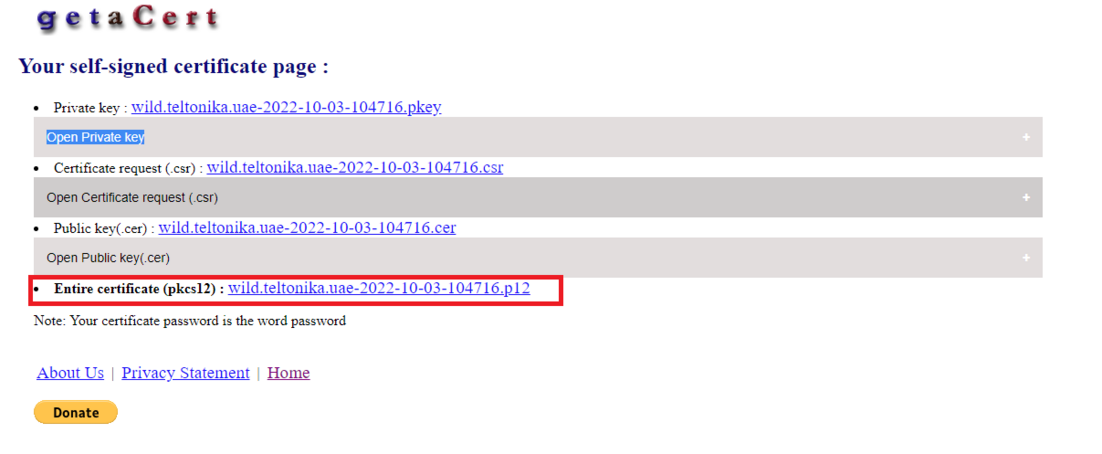
- 9 Go to the Microsoft search bar and type: cer then choose Manage user certificates:
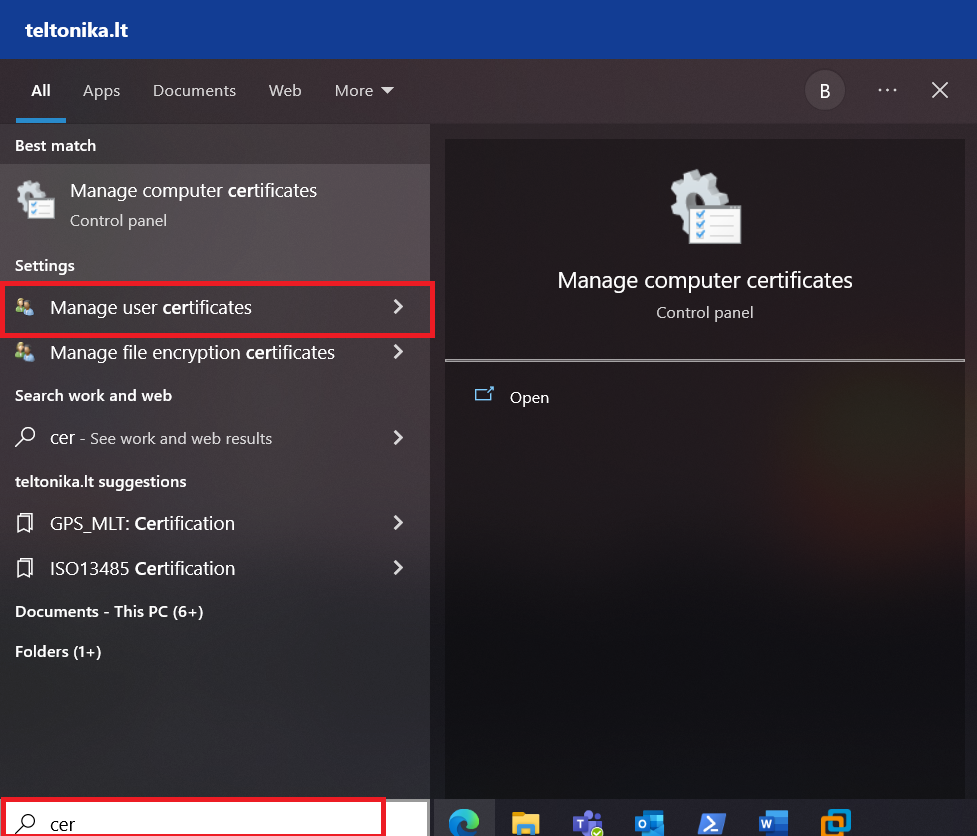
- 10 Go to Trusted Root Certification Authorities:
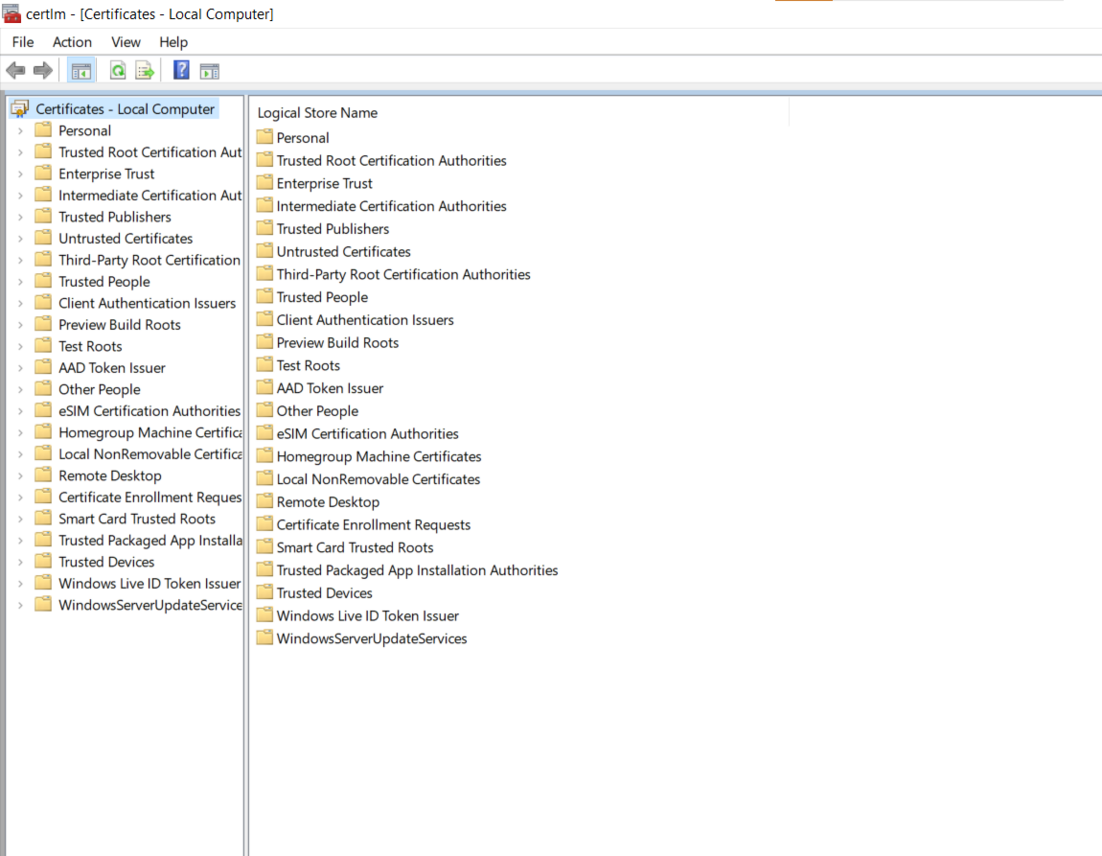
- 11 Right-click and highlight All Tasks, click Import…
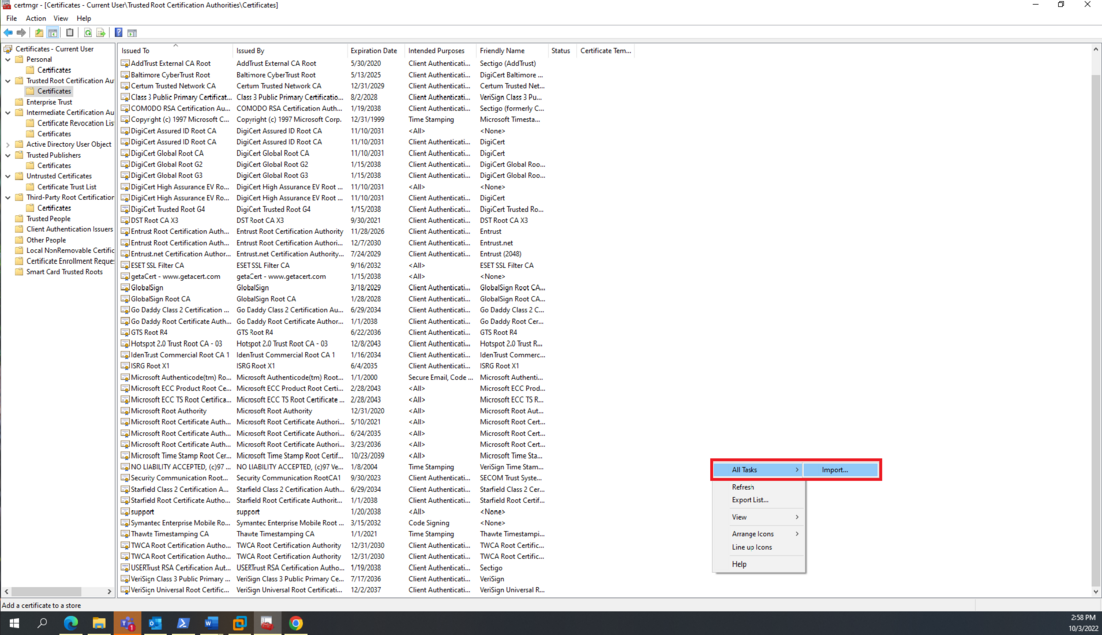
- 12 Choose the .p12 file downloaded before:
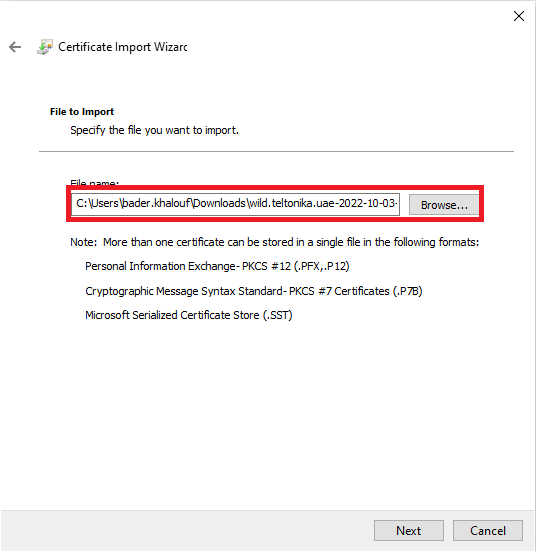
Then Next, then Next, then Finish.
RUT configuration:
The final part: Go to System → Access Control → WEBUI
1) Turn off Certificate files from device.
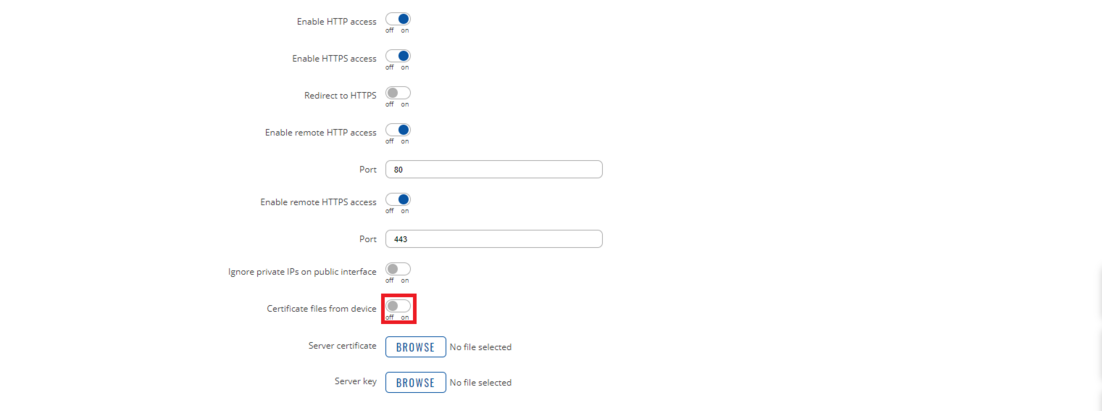
2) Click browse in Server certificate and choose the [.crt] file created.
3) Click browse in Server key and choose the [.key] file created.
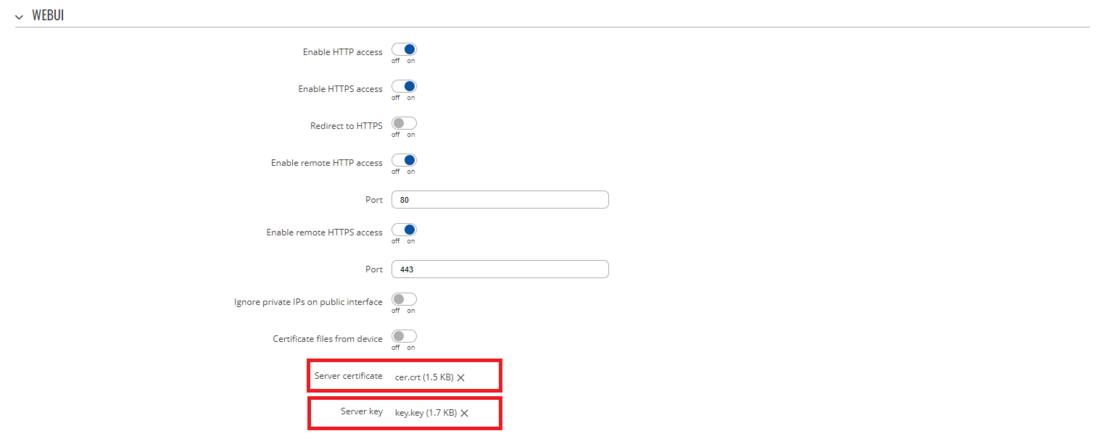
4) Click SAVE & APPLY.
Open the WebUI again using the DNS record:
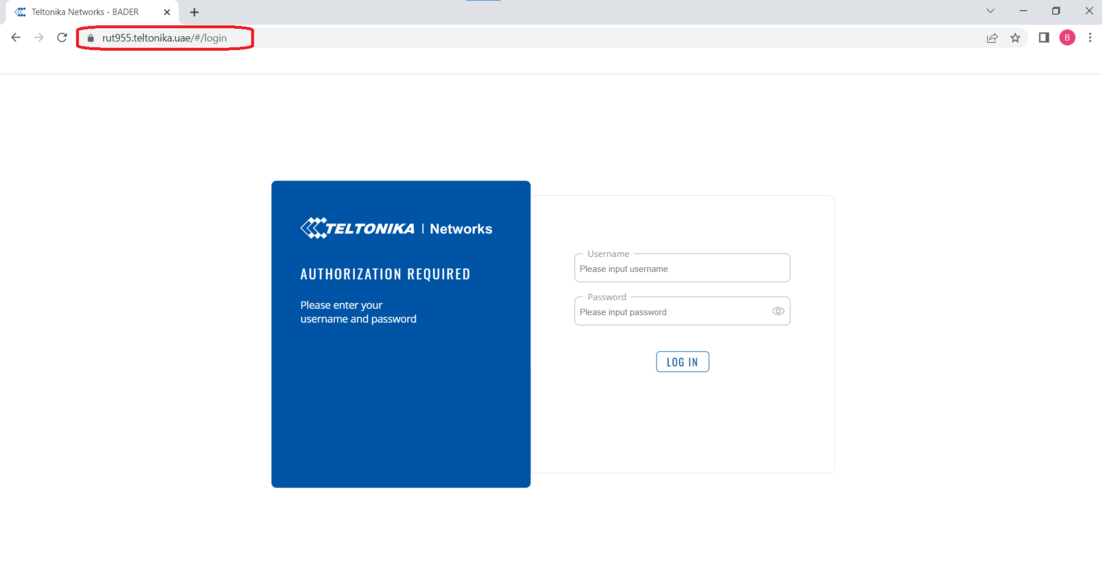
Now we can access the WebUI securely, and we can turn of the HTTP access.
